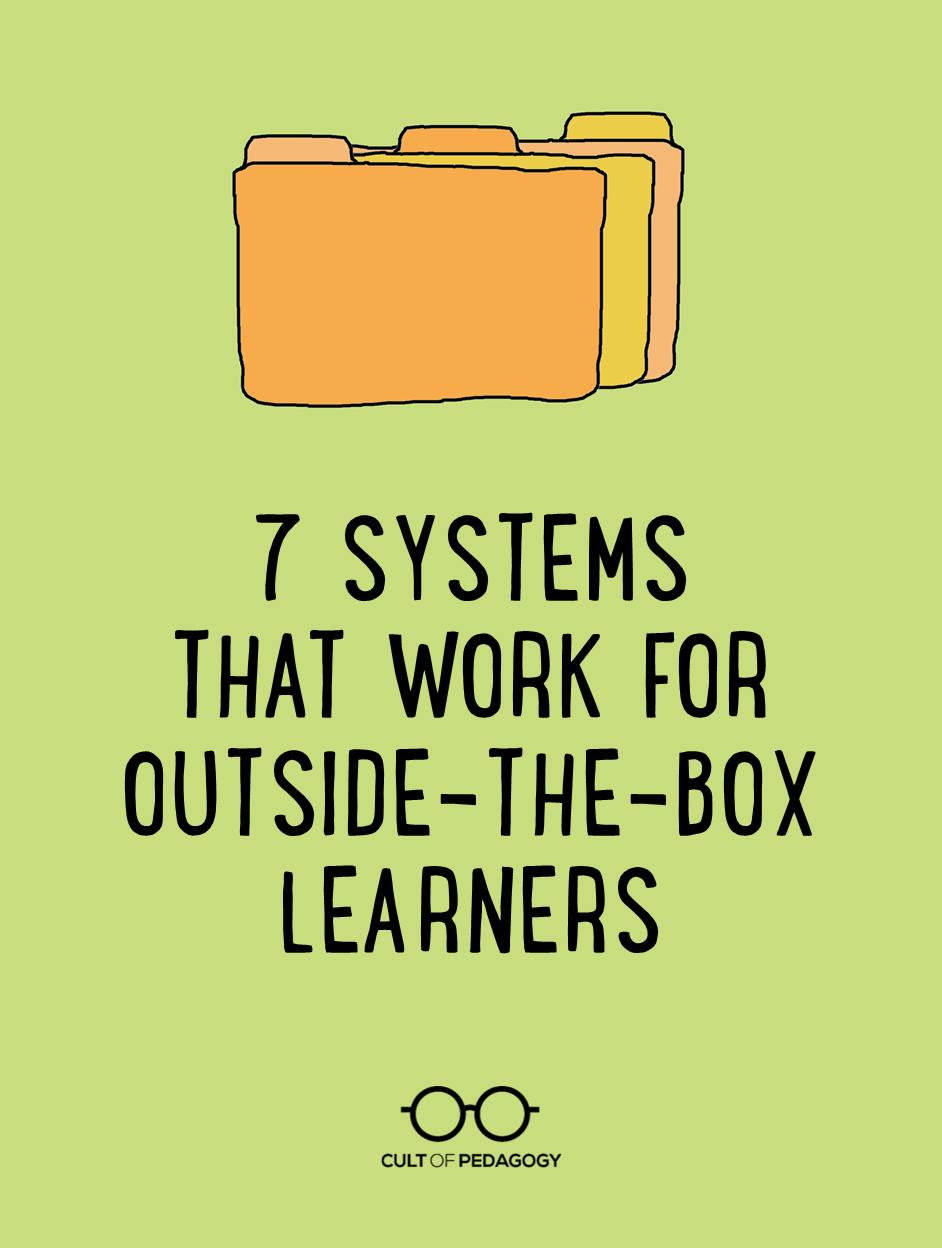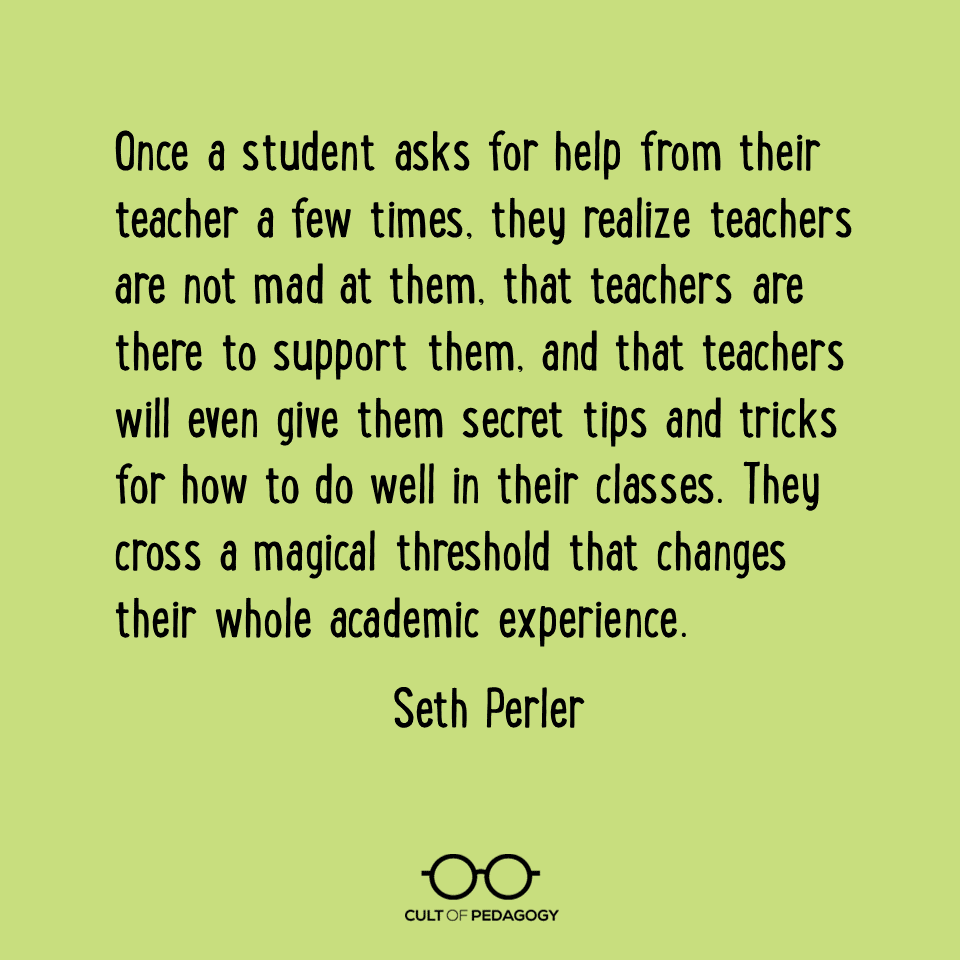
Listen to my interview with Seth Perler, executive function coach (transcript):
It seems every teacher in every school struggles with what they might call unmotivated, lazy, or disorganized learners. These students seem to have a ton of potential, their test scores might even be pretty high, but they can’t ever seem to get it together school-wise.
In my own teaching experience, I spent an inordinate amount of time on these students, giving them lists of make-up assignments to do, meeting with them at lunch or after school to help get them caught up, contacting parents, helping them go through their binders and backpacks and lockers to find missing work, and coming up with lots of different ways to basically say the same thing: You just need to stay organized.
It’s not motivation; it’s executive function.
It turns out this set of skills actually has a name: executive function. The first time I heard this term in Paul Tough’s 2012 book, How Children Succeed, it was like a light bulb going off: Kids who struggle with executive function often have perfectly good academic abilities, but they don’t have the same ability as most students to stay on top of the little details that make life run smoothly. So when we try to get them to manage those details like most other kids do, our efforts fail.
If I had known that, and if I’d had someone like Seth Perler to show me what to do differently, I would have been able to help these kids have a much more rewarding school experience.

Seth Perler
Seth Perler is an Executive Function coach who works with these students he refers to as “outside the box learners.” Because Perler was an outside-the-box learner himself, when he became a teacher, he knew how to reach this type of student. During his years in the classroom and then as an education coach, he has developed seven systems that he teaches these kids to help them meet deadlines, keep track of materials, and manage their time.
What’s interesting about these systems is that although some of them may seem obvious at first, it’s the little tweaks Perler gives them that actually make them work. What most of us have tried with these students turns out to be counterproductive; we’ve approached them in the same way that we approach our other students. For most kids, our standard methods for keeping them organized work just fine, but these kids need something different. Once you learn about these little tweaks—like why folders are far better than 3-ring binders—you’ll be able to change your approach, share these insights with parents, and start to see some real differences in how these kids do in school.
Implementing the Systems
For these systems to work, Perler says, parents and teachers have to help students build them into habits. This takes patience, compassion, and more time than is typical for most students.
“It takes two good solid months of continuous effort with these kids to really build a habit,” he says. “It’s not easy. The brain is literally changing. The neurons in the brain are changing. They are building new networks that are helping them to execute, to use executive function to manage what are really an overwhelming amount of details we expect these kids to manage.”
What does that “time” look like? Perler recommends a weekly overhaul, done on Sunday nights, to hit the reset button on all of these systems and prepare the student for the week ahead. Done consistently, this will eventually make habits out of all of these systems, and the student should start to see big improvements.
1. Paper Management
Use a separate folder for every class.
“Organized adults will often recommend that kids use three-ring binders,” Perler says. “Their idea is, ‘Well if it helps me stay organized, obviously it would help a disorganized kid become more organized.’ But for kids who struggle with executive function, three-ring binders are horrible. There are so many details in terms of opening a big binder, finding the right place for the paper, unclicking it, putting it in with the three holes, re-clicking it, closing it carefully. These are kids who really just want to get it done.”
What works better? “Cheap paper folders,” Perler says. He recommends the following:
- Use a separate folder for every class, with a different color for each folder.
- Choose paper folders, not plastic, because plastic is too slick and can cause papers to slide out too easily.
- Write the subject name directly on the folder in big letters, so it’s easy to find. Then turn the folder over and write it on the back.
2. Backpack Management
Everything out, once a week.
Most kids are what Perler calls maintainers, because they are able to maintain a semi-organized backpack, taking out unnecessary items as they go and keeping things more or less organized. But students who struggle with executive function tend to be overhaulers, waiting until things get totally out of control and then doing a complete overhaul.
“Let’s say you have a really disorganized kid,” he says. “One day you come home, they’ve completely rearranged their bedroom, put all their furniture in different places, and completely cleaned out the whole bedroom. That’s an overhauler. They like to overhaul.”
When it comes to backpacks, however, this overhaul doesn’t come frequently enough, and that results in backpacks where papers are lost or damaged. Perler recommends students do a weekly backpack overhaul:
- Once a week, pull everything out of the backpack.
- Throw out things you don’t need, reorganize the things you do.
3. Planner
Keep it plain and simple.
“A lot of schools will buy planners for the entire school,” Perler says. “They’ll have the hall pass in the back, the school handbook in the front. They have the periodic table in the back, commonly misspelled words, famous quotes on the papers, and a bunch of colors often on the pages. It turns out that these planners are awful for the kids that I work with, for kids who struggle with executive function. It’s too much. These are kids who really want to get at the heart of the matter within seconds. They don’t want to have to flip pages and find things.”
Perler recommends a much simpler planner for these students:
- Get a month-at-a-glance planner, rip out every single page that isn’t the calendar of the months they will be in school. 10 pages max. “These kids tend to be very global thinkers, so seeing the entire month is a lot easier for their brain to learn to conceptualize time,” Perler says.
- To make the most of the smaller spaces on the planner, develop a shorthand system for recording important deadlines and other information.
- Do regular check-ins with a parent or teacher make sure the planner is being maintained.
4. Grade Monitoring
Check once a week at minimum.
Although we have discussed on this site about the danger of parents monitoring their child’s grades too closely, with students who struggle with executive function, it’s helpful to work with the student to develop a habit of monitoring their own grades.
- Once a week (at least), go into your school’s online grading portal and check all grades.
- Look at the details: Are there incomplete grades? Missing grades?
- If the teacher hasn’t been inputting grades on a regular basis, recent grades may not be available. Check with the teacher if you need more recent grades.
5. Self Advocacy
Make an actual appointment to see the teacher in person.
Although teachers make themselves available to students for help, and struggling students may intend to see them for it, in reality they often forget or put it off. For that reason, Perler recommends students agree on a time to meet with the teacher, rather than just intending to talk with them.
“Usually I’ll have them write a short email to the teacher that says, ‘Hey, I’d love to see you at office hours. When’s the best time for me to come in?’ The teacher can then say, ‘Come in at 3 o’clock tomorrow,’ and it puts accountability on the situation that they didn’t have before. Most of the time the student will show up, and I will tell you that I have so many kids come back to me and say, ‘Wow, that was so helpful. That was so easy.'”
Perler says self-advocacy is one of the easiest habits to develop. “Once they ask for help from their teacher two or three or four times, they have crossed a magical threshold that changes their whole academic experience. They realize that teachers are not mad at them. That teachers are there to support them. That teachers will give them the time they need. And that teachers will even give them secret tips and tricks for how to pass their classes or how to do well in their classes.”

6. Sacred Study Space
Establish a distraction-free space at home just for school work.
This is a classic, but it may be an overlooked factor in a student’s poor performance. “We really need to help kids learn to create a space that has the supplies we need that is decluttered, that is free of distraction. And that’s very hard for families, by the way. Because real life is happening.”
Rather than prescribe a specific type of space, Perler recommends building sharper awareness about the choices that will work for the specific student and the kind of school work they need to do at a given time. “The couch might actually be an effective place for some students some of the time to study. But I want them to make conscious choices: ‘Sitting on the couch is going to help me relax into this book, so that I can really get in the mode,’ or ‘Sitting on the couch, especially with the TV on, is a ridiculous idea for me to be studying this biology stuff right now.’
7. Weekly Overhaul
Choose a time once a week to overhaul all systems.
Rather than “intending” to do the weekly overhaul, Perler recommends setting a specific time to do it every week, and post that time somewhere visible. “If you miss a time or two, that’s fine,” he says. “It’s going to happen. But print up when it is and what time, so that you don’t have the argument with your child about it, and it’s concrete, and it’s on the wall.”
Here’s what the overhaul should include:
- Empty out and tidy the backpack
- Update the planner, tear out old pages, cross everything out that is no longer relevant. Look forward to the upcoming week.
- Go through each folder and get rid of everything you no longer need.
- Check grades online.
- Overhaul the desk or home study area.
You can learn more from Seth Perler by going to his website, sethperler.com, and subscribing to his email updates & Student Success Toolkit. Seth has created a special Student Systems Assessment to help students determine which of these seven areas they need the most work on. You can download that here.
Join my mailing list and get weekly tips, tools, and inspiration—in quick, bite-sized packages—all geared toward making your teaching more effective and fun. You’ll also get access to my members-only library of free downloadable resources, including my e-booklet, 20 Ways to Cut Your Grading Time in Half, which has helped thousands of teachers spend less time grading!





I needed this post for myself! I am certainly an overhauler, and I hate it with a passion! But it’s nice to read steps I can take to help myself, and my students. I intend to share this post with the families of my students, because a few of them are only struggling because of many of the ideas mentioned here. Thank you!
I hear you! I’m a teacher also but my youngest son is being described in these posts! Currently, like Pam, We’re using the colored folders within the 3 ring binder (AVID program colors). We cross out old planner pages and keep a minimalist backpack. I’m currently substitute teaching in order to have the flexibility to overhaul our home. I’ve connected a document camera to our large flat-screen TV for study space #1 (kid’s, you be the teacher). We also have a study/ library space in our home for space #2 (small groups). Additionally, each kid has a small desk in his/ her own room for space #3 (I need a quiet place to study). Furthermore, I have review sheets laminated in sheet protectors for the car ride for study space #4 (sing-along study time commute :). Finally, it took me about a week to clean out my garage, but I’m thinking of placing some folding tables and chairs in there for study space #4 (neighborhood tutoring). My kids are pushing back hard with: “You’re a teacher, but not my teacher! …and my teacher didn’t say I had to do all that! This is really overboard, Mom!”
I think the missing puzzle piece for me is consistency. I just need to keep plugging away and also schedule predictable breaks with regular rewards so the kids don’t feel as if they never get a break. (Playing video games is a worthless break, in my opinion, but I want to honor their need to relax.) I’m both challenged and inspired by this article. I want to learn more.
Me too
I loved this. As I’m listening, I can picture a student who falls into this category. Now I understand why the student was successful in one teachers class but not in the other teachers….the first removed the executive functioning barriers while the other didn’t. It wasn’t so much about the instruction, but rather the organization and clarity. I don’t think I could have put my finger on this before. It makes so much sense!! Thank you.
Great stuff. Unfortunately, I am in a system that insists on 3 ring binders and those year-long planers I laughed about just now. So I’ll have to figure a way to circumvent the system. Won’t the first or last time and if it works … everybody wins. Thanks for this and all you do.
Maybe if they insist students use the 3 ring binder, add in the colored folders for each class. They would still be separated and more readily accessible. (Not needing to click open the 3 ring binder, just get the paper out of the folder).
Talk to the school. Executive function problems is a known learning disability; if they try to tell you, “well you have to use the same three-ring binder as everyone else,” they are refusing a reasonable accommodation.
This. Is. Everything. Now I understand why those certain few students could never quite get it together, no matter how many “systems” I put in place. Thank you for posting this–I am going to share it far and wide.
Thank you! Concise and well-organized information. Jennifer, I don’t mind your potty mouth – I have one, too!!
How do I find an executive function coach for a college student or a high school student?
Seth works with high school students and has done work with some college students. You may want to reach out to him on his website at sethperler.com.
Thank you for this information! I have a conference scheduled with the mother of one 3rd grade ELL boy who I’ve often described as a “hot mess”. He is very bright, has so much potential, but just can’t manage his time, materials, or attention. He has 2 speeds- 100 mph and lethargic. Now I have some ideas/action steps to share with mom on how to help get him organized. I’ll be sharing with his gen ed teachers, too.
Great helpful information!
These are great suggestions, but they require a lot of home support. Not all kids have access to a dedicated study area. Parents who are not English speakers may not feel comfortable with “throw out everything you don’t need”. Some kids come home to an empty house or get themselves to school in the morning if their parents work unusual hours. Many teachers will take on the task of mentoring students, and other teachers solve the problem by making sure most of the work stays in the classroom. Our school uses the folder system, but getting all the pieces in place for a disorganized student is tricky.
Thanks for sharing this ideas… is very useful for my personal life and for my students… I will your blog with them.
Great Podcast! I was picturing several students faces while I listened. It will certainly change how I handle folders in the future. BTW What is up with your website? I can’t get it to load any pictures and only comes up as an outline of links without any formatting. I have tried it in both Chrome and Explorer.
Not sure what was going on. Is it working now?
Kendra, When that happens at my school, it’s usually on our end. Try your tech department and see if they can fix it! 🙂
This is my son. Thank you for the advice!
This was a great podcast. I feel like it could definitely be useful for some of my students, but I also think I was one of those kids who struggled with executive function. I compensated by memorizing as much as I could — and I was bright enough to finish homework at school most of the time.
I still constantly have an enormous bag of paper that always needs sorting. I never could use a planner. I compensate by keeping as much as I can electronic.
What do you do when a student absolutely refuses to use a planner, modified or not? We’ve had the discussions, they admit they need to know what they have to do and say they will do the work when they know they have it, but in practice they start off by “forgetting” to bring their system in daily. They then progress to losing the new modified system you handed them just five minutes ago, then won’t fill it in even when you do the work for them and tell them what to write. They won’t take it to their classes with them and manage to lose them before a teacher can sign it right after you have brought it to them. They don’t respond to a parent meeting, a reward system for earning something from the reward list they created, staying in for a working lunch, etc. Then although they still insist they are going to do their work, say, planners aren’t for me, I don’t want a to do list, I’m just going to remember it. This after admitting daily they forgot. I’ve been teaching for years and this year have two students doing this. I’ve never seen it this bad, usually your process or something similar works really well with my students. They are in high school and they are not responding to treating them like an adult, positive or negative consequences, scaffolding things to the nth degree, natural consequences, etc. The funny thing is they show up to their classes every single day and do very little in class work and zero homework, even when someone sits with them, they choose to distract, avoid, etc.
When I was in school I failed all of the suggestions that were listed from Elementary school through high school. However the primary difference from what you describe and what I was like is that it was more of the fact that homework/classwork bored me to tears (and may have gotten worse since I was in school with much of the focus being on testing).
Do these students test well? I always tested well because I just wanted to move on to the next thing. I was like “I already know this let’s move on, GDI why does everyone else have questions…”
It use to drive my teachers batspit crazy because I would go into a test in an open notes test without notes and remember the facts and figures from anything that was read about or discussed in class, but I couldn’t remember to bring my homework in… or forgot to do it entirely. I had to be REALLY interested in a topic for me to do my homework (which bamboozled my teachers further because my history teachers at the parent conferences were all like “Yeah, I don’t know what kid they are talking about but your child does his work for my class….”
Probably much of this had to do with undiagnosed ADHD on top of issues with homelife (which was mentioned in previous comments).
I agree with everything here except the separate folders for each class. If, for example, a middle school student has potentially six to eight different classes – that is up to 8 folders that need to be managed. This includes transport from class to class and from school to home (and vice versa).
One master notebook (binder) eases the demand on the EF systems required for materials management and organization. We implement such a system at Delaware Valley Friends School- a school for children with learning differences including EF needs. We took the lead from Landmark College and are quite happy with the results. The key to success is consistent implementation and procedures across all classes and buy in from the faculty. I am interested to hear others thoughts and experiences.
I loved this post so hard! And I can think of so many students this applies to! Thank you Jennifer (education’s brilliant diamond) and Seth Perler.
I love that so many have adopted “Outside-the-Box” Learners — a term I used when I established my website in in 1998: ADHD/Special Needs … Misunderstood Kids Outside the Box! http://adhd.kids.tripod.com/index/index.html
excellent commentaries and suggestions
I’ve gleemed so much useful info from your website but only wish there was a pin for pinterest.
Hi Terri,
On the site there’s a link to Jenn’s Pinterest board, but here it is just in case.